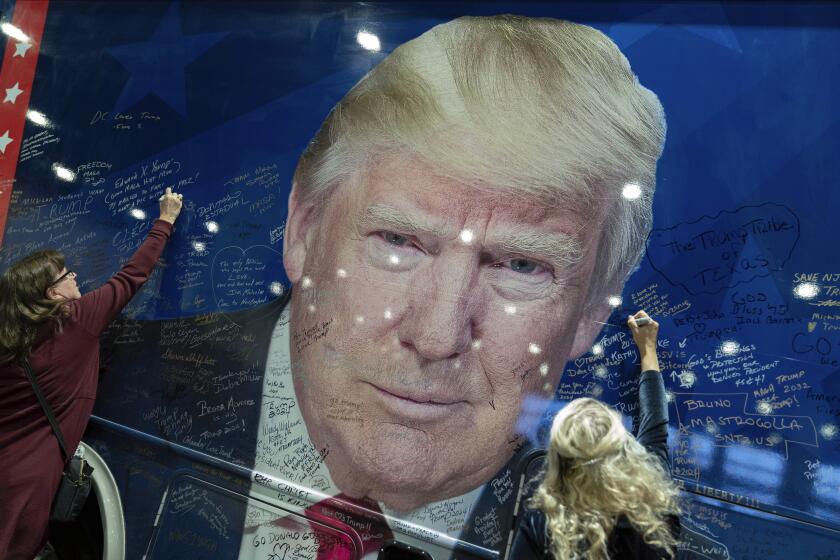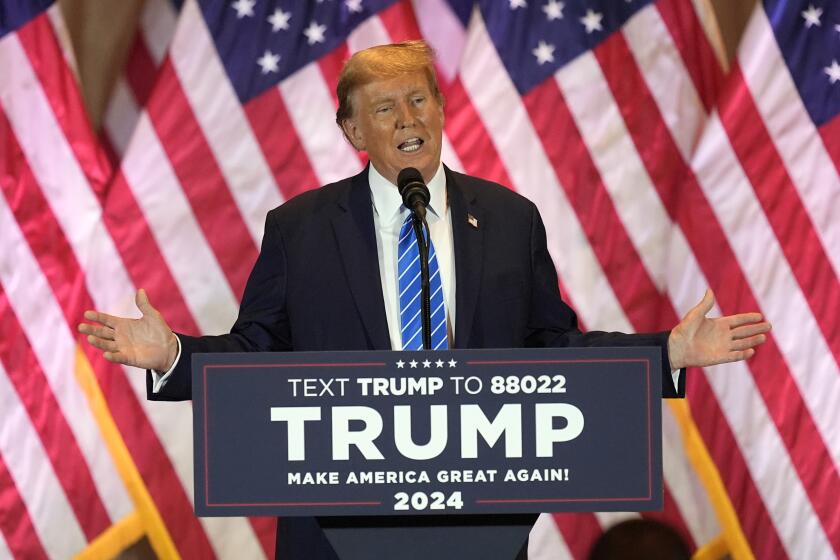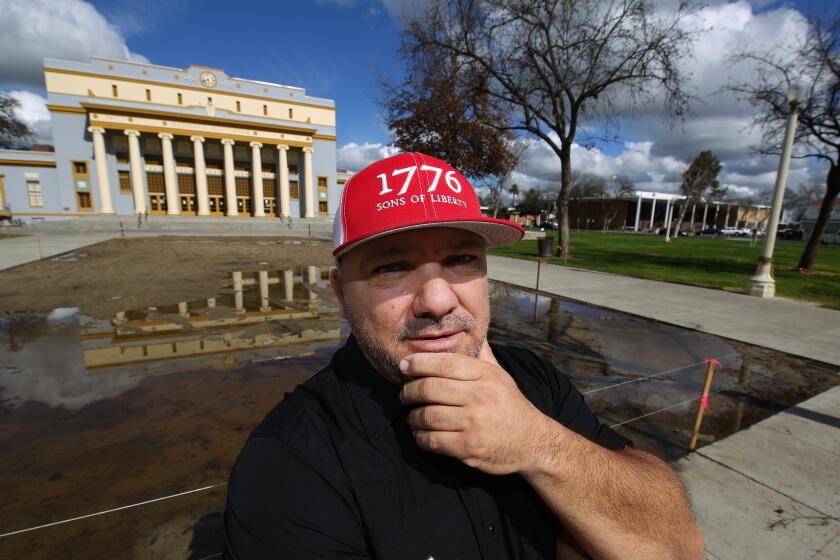Opinion: What the media still get wrong about Trump voters

- Share via
Many factors explain why people across Western democracies vote for politicians like former President Trump, including economic concerns, rural resentment and racial animosity. Although Trump supporters have been characterized as “left behind,” “stigmatized” or even “marginalized,” these ascriptions are dangerously off base.
For one, they fuel the self-victimization narratives common among radical right movements, driving conspiracies and support for this ideology. Moreover, they neglect that historically powerful groups such as white people, men and Christians are overrepresented among Trump supporters. Even today, these groups remain privileged politically, economically and culturally. By objective measures, most Trump supporters are not left behind, stigmatized or marginalized.
Most college-age voters remember Barack Obama vaguely at best. Kamala Harris’ campaign is their first experience of a more hopeful presidential candidacy.
That said, research suggests that white people, men and Christians nevertheless may subjectively feel excluded from society, which could explain the unwavering support many show for Trump. A nuanced understanding of how people feel included or excluded may help explain what those Trump supporters are really seeking.
Social psychological theories suggest two necessary conditions for people to feel included. First, they need to simply belong to the larger group — as white people, men and Christians in U.S. society do. Second, they need to feel that their unique backgrounds are respected and appreciated within the larger group. Hence, people may feel excluded from a group when they feel unseen or disrespected for their backgrounds even if they belong to the group.
‘You don’t need me to tell you that the former president is a liar, a cheat, a fraud, a bigot, a bully — I could go on,’ says a reader. ‘You know this and ignore it.’
In a recent study, I examined whether this second factor creates exclusion experiences among Trump supporters: Possibly, substantial shares of white people, men and Christians experience belonging to U.S. society but feel unseen or disrespected as members of those groups. To be clear, they are objectively seen, respected and even privileged. However, earlier studies indicate that growing shares of white people, men and Christians may subjectively feel disrespected, disadvantaged or neglected.
Using surveys, I mapped the extent to which white people, men and Christians experience belonging to U.S. society and feel that their backgrounds are respected. Generalizing from representative samples gathered in 2016 and 2020, I found that about 21% of white Americans feel they firmly belong to U.S. society but feel disrespected as a white group. Likewise, up to 20% of men and 35% of Christian Americans feel their backgrounds are disrespected.
This perception has political consequences: Compared with individuals experiencing both belonging to the nation and respect for their background, people who felt disrespected were more likely to vote for and sympathize with Donald Trump.
God must work in very, very mysterious ways if we are to believe Trump supporters who say the former president is divinely anointed.
His camp has long appealed to members of privileged groups who feel disrespected, as seen in slogans such as “white lives matter” and “make men men again.” This rhetoric promises to “restore” attention and respect for people who subjectively feel unseen. Trump fuels and exploits these individuals’ perceptions of disrespect and neglect. Radical right candidates often pledge to maintain inequities favoring privileged groups. Some members of privileged groups are vulnerable to that sales pitch.
This fervent support for existing inequality underscores that these people are not marginalized. Members of marginalized groups try hard to fit in, for example by changing their names to pass for members of a majority. This is not what we see among vocal Trump supporters, who proclaim their identities and assert that their background constitutes the “true Americans.”
Instead of trying to fit in, they seek to stand out: They stress that “white lives matter” even if white lives are not threatened; they defend heteronormative gender roles that don’t need defending; and they promote stereotypical Christian-right life choices such as traditional marriage and procreation.
The key to understanding why the members of privileged groups would be vulnerable to Trump’s appeals is this: subjective perceptions of exclusion or disrespect. And how does he meet the emotional needs of people who feel excluded or disrespected? By emphasizing the aspects of their identity that they feel do not receive appropriate respect.
This understanding has implications for how other Americans should deal with Trump supporters.
First, researchers, journalists and citizens should be more careful when explaining Trump support. Too often, characterizations of the Trump base repeat explanations that are scientifically refuted, such as considering most radical right voters as people with little income who are merely protesting against political elites. This not only covers up true discrimination and inequities against disprivileged groups but also fuels pro-Trump sentiment.
Sloppy language about Trump sympathizers being “left behind” is dead wrong; they are members of dominant groups who want to remain dominant. Ultimately, Trump voters support an ideology that is racist, sexist and exclusionary. Backing a radical right politician is not a protest vote but a vote for the status quo.
Second, research widely shows that liberal parties do not win back votes by shifting to the right. Instead, that strategy reinforces radical right rhetoric and support for those parties. A more promising approach would be to remind white people, men and Christians of the attention and respect they objectively enjoy already. If some members of these groups experience belonging to the American nation but subjectively feel disrespected, correcting these misperceptions may help these individuals feel included. In a polarized news environment, many Americans have many misperceptions about members of other groups; members of privileged groups may consume news that gives the mistaken impression that others disrespect them. Any factual information that can reach such privileged individuals may reduce perceptions of neglect or disrespect.
Third, Democrats need to offer liberal conceptions of what whiteness, masculinity and Christianity may look like. Vice President Kamala Harris’ campaign seems to have grasped this by choosing Gov. Tim Walz of Minnesota as her running mate. He represents such a liberal vision, as a man who supports women and as a white Christian who embraces diversity. Other white Christian men could take a cue from him; they don’t have to feel excluded.
The current election is an opportunity to correct the problematic discourse around Trump support. Generic assumptions about white, male or Christian voters’ marginalization strengthen self-victimizing narratives. Instead, careful inquiries into individuals’ experiences can bridge the chasm between objective privilege and subjective perceptions of disrespect — which can lead to inclusion experiences among majority members who currently feel excluded. Ultimately, doing so offers one way to mitigate support for racist, sexist and polarizing ideology in the U.S. and beyond.
Luca Versteegen is a postdoctoral fellow at the University of Vienna in Austria. His research examines how group identities and emotions shape individuals’ perception of societal developments and motivate political reactions to these perceptions.
More to Read
A cure for the common opinion
Get thought-provoking perspectives with our weekly newsletter.
You may occasionally receive promotional content from the Los Angeles Times.













